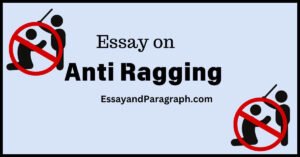10 Lines Essay on Should Plastic Be Banned?
Plastic is a widely used material in daily life.
It is found in packaging, bottles, bags, and many products.
However, plastic takes hundreds of years to decompose.
It is harming the environment, especially oceans and wildlife.
Marine animals often mistake plastic for food, leading to death.
Many people believe banning plastic will reduce pollution.
Some argue that plastic is essential for convenience and industries.
Finding alternatives to plastic can be costly and challenging.
Reducing plastic use through recycling can also help the environment.
In the future, we need to find a balance between convenience and sustainability.

Essay on Should Plastic Be Banned? – 100 Words
Have you ever wondered how much plastic we use in our everyday lives? Plastic has become an essential part of our modern world, but it is harming our environment. Plastic waste, which takes hundreds of years to break down, is polluting our oceans, harming wildlife, and impacting human health. Many people believe that banning plastic could help reduce pollution and protect the planet for future generations. However, others argue that banning plastic could have negative effects on industries and everyday convenience. In this article, we will explore the pros and cons of banning plastic.
Short Essay on Should Plastic Be Banned? – 150 Words
Plastic is a common material used in daily life, from packaging to household items. However, plastic waste poses a major environmental problem. It takes hundreds of years to decompose, leading to pollution in landfills and oceans. Marine animals often mistake plastic for food, which causes injuries and deaths. This widespread pollution disrupts ecosystems and harms biodiversity.
Many people argue that plastic should be banned to reduce pollution and protect wildlife. Banning plastic could encourage the use of safer alternatives, like biodegradable materials. However, others believe that plastic is essential for industries and convenience. A ban might result in economic challenges, as plastic is cheaper and more widely used.
The solution might not be an outright ban, but reducing plastic use and promoting recycling. By using reusable items and finding sustainable alternatives, we can lessen the impact of plastic on our planet and create a cleaner, healthier environment.
Essay on Should Plastic Be Banned? – 200 Words
Plastic is everywhere. From food packaging to everyday items, we rely heavily on plastic in our daily lives. But did you know that plastic is one of the biggest pollutants harming the Earth? Plastic waste, especially single-use plastic, is not only filling our landfills but also finding its way into oceans, killing marine animals, and threatening ecosystems. Most plastic products take up to 500 years to decompose, and the effects on our planet can last for generations.
A growing number of environmentalists argue that plastic should be banned to protect wildlife and reduce pollution. By banning plastic, we could encourage the use of biodegradable materials and create a cleaner, healthier planet. However, some argue that banning plastic could negatively impact industries that rely on plastic, like packaging and manufacturing.
While banning plastic may seem like a drastic solution, it’s an important conversation. We need to explore alternatives and find ways to balance convenience with sustainability. In the end, plastic use is a problem we all need to tackle together for a greener future.
Short Essay on Should Plastic Be Banned? – 250 Words
Plastic is a part of our daily lives, found in everything from food packaging to bottles, bags, and household items. It is lightweight, durable, and cheap, making it highly convenient. However, plastic also has a serious downside: it is harmful to the environment. One of the biggest problems with plastic is that it takes hundreds of years to decompose. In the meantime, it piles up in landfills, streets, and oceans, causing pollution.
The ocean is especially impacted by plastic waste. It is estimated that millions of tons of plastic enter the ocean each year, where it harms marine life. Sea turtles, fish, and birds often mistake plastic for food, which leads to serious injury or death. Additionally, plastic waste is damaging ecosystems and disrupting biodiversity.
Due to these environmental impacts, many people believe that banning plastic is the solution. By doing so, we could reduce pollution and protect wildlife. However, others argue that plastic is essential to many industries, such as packaging and healthcare, and banning it could have negative economic consequences.
While a complete ban on plastic might be difficult, reducing its use is crucial. Encouraging the use of reusable products, increasing recycling efforts, and exploring sustainable alternatives to plastic are key steps toward solving this problem. Ultimately, balancing convenience with environmental responsibility is essential for a healthier planet. The need for change is clear, and we must act before it’s too late.
Essay on Should Plastic Be Banned? – 500 Words
Plastic has revolutionized our modern world. It is used in almost every industry, from food packaging to healthcare, transportation, and construction. Unfortunately, the benefits of plastic come at a significant environmental cost. While plastic is cheap, lightweight, and durable, its negative impact on our planet cannot be ignored. In this essay, we will explore whether plastic should be banned, considering its environmental impact, economic implications, and the possible alternatives that could help reduce plastic waste.
One of the main arguments for banning plastic is its harmful effect on the environment. Each year, millions of tons of plastic are produced and used, much of it for single-use items. These plastics take hundreds of years to decompose, which means they remain in our environment for long periods, contributing to pollution. One of the most significant environmental issues caused by plastic is marine pollution. It is estimated that around 8 million tons of plastic end up in the ocean every year. Marine animals, such as fish, turtles, and birds, mistake plastic waste for food, leading to injuries or even death. This pollution also disrupts the natural balance of ecosystems and threatens biodiversity.
Moreover, plastic is made from non-renewable fossil fuels, which further contributes to environmental degradation. The extraction and processing of these resources lead to air and water pollution, as well as the release of harmful greenhouse gases that contribute to climate change. Reducing plastic production could have positive effects on reducing global warming.
Despite these environmental concerns, some argue that banning plastic could have negative economic effects. Industries such as packaging, retail, and manufacturing rely heavily on plastic for packaging, products, and transportation. A sudden ban on plastic could lead to job losses and economic challenges. Additionally, plastic is an affordable material that makes goods cheaper and more accessible. Alternatives to plastic, such as paper or biodegradable materials, may be more expensive, which could lead to higher costs for consumers.
Another important factor to consider is the need for alternative materials. While there are some biodegradable alternatives to plastic, they are not yet as widely available or affordable. The widespread use of these alternatives could be a solution, but it would require significant investment in research, development, and infrastructure to make these alternatives more practical and efficient.
In conclusion, the question of whether plastic should be banned is complex. While the environmental impact of plastic is undeniable, the consequences of banning it could have significant economic implications. However, if we continue to rely on plastic without addressing the environmental crisis it creates, future generations will bear the brunt of the damage. To achieve a sustainable future, we must explore alternatives, reduce plastic consumption, and increase recycling efforts. It is clear that change is necessary, but finding the right balance will require global cooperation and innovation.
FAQs about Should Plastic Be Banned
1. Why is plastic harmful to the environment?
Plastic is harmful because it takes hundreds of years to break down. This means plastic waste accumulates in the environment, particularly in the oceans. Marine animals often mistake plastic for food, which leads to death or injury. Additionally, plastic waste disrupts ecosystems and harms biodiversity. Reducing plastic waste is crucial to protecting wildlife and maintaining a healthy environment for future generations.
2. What are the alternatives to plastic?
There are several alternatives to plastic, such as biodegradable materials like paper, glass, and plant-based plastics. Some alternatives are made from natural resources, like corn or sugarcane. These materials decompose more quickly and are less harmful to the environment. However, these alternatives are still developing and are often more expensive than traditional plastic. For these alternatives to be viable on a larger scale, more research and investment are needed.
3. How can we reduce plastic usage in daily life?
We can reduce plastic usage by opting for reusable items, such as bags, bottles, and containers. Many people have started using cloth bags for shopping, stainless steel water bottles, and reusable coffee cups. Avoiding single-use plastic items, such as straws and cutlery, can also make a significant impact. Educating ourselves and others about the importance of reducing plastic can lead to collective change in how we consume products.
4. What is the impact of banning plastic on industries?
Banning plastic could have a significant impact on industries that rely on plastic for packaging, manufacturing, and transportation. It may lead to higher production costs and job losses in certain sectors. However, the transition to sustainable alternatives could create new jobs in green technologies and waste management. The key challenge is finding a balance between the benefits of banning plastic and the economic impact it may have on certain industries.
5. Can recycling solve the plastic problem?
Recycling is an important part of reducing plastic waste, but it is not a complete solution. While recycling helps to reuse plastic materials, only a small percentage of plastic is actually recycled. Many types of plastic are not recyclable, and recycling processes themselves can be energy-intensive. To address the plastic problem fully, we must focus on reducing plastic production, increasing recycling rates, and exploring sustainable alternatives.
Top 5 Quotes on Plastic Pollution
“Plastic pollution is a global crisis that threatens wildlife, our oceans, and human health.” – Unknown
“We don’t need a handful of people doing zero waste perfectly. We need millions of people doing it imperfectly.” – Anne-Marie Bonneau
“There is no planet B. Plastic waste is threatening our future.” – Unknown
“We must rethink plastic use, one bag, bottle, and straw at a time.” – Unknown
“The Earth does not belong to us, we belong to the Earth.” – Chief Seattle
Summary: on Should Plastic Be Banned
Plastic is one of the most widely used materials in the world, but its environmental impact cannot be ignored. From polluting oceans to harming wildlife, the negative consequences of plastic waste are becoming more evident. While banning plastic may seem like an extreme measure, many believe it is necessary to protect the planet. However, the economic impact of banning plastic and the need for sustainable alternatives must be carefully considered. In the end, reducing plastic use through education, alternatives, and recycling could help create a cleaner, healthier future for our planet. By taking small steps today, we can make a significant impact tomorrow.




